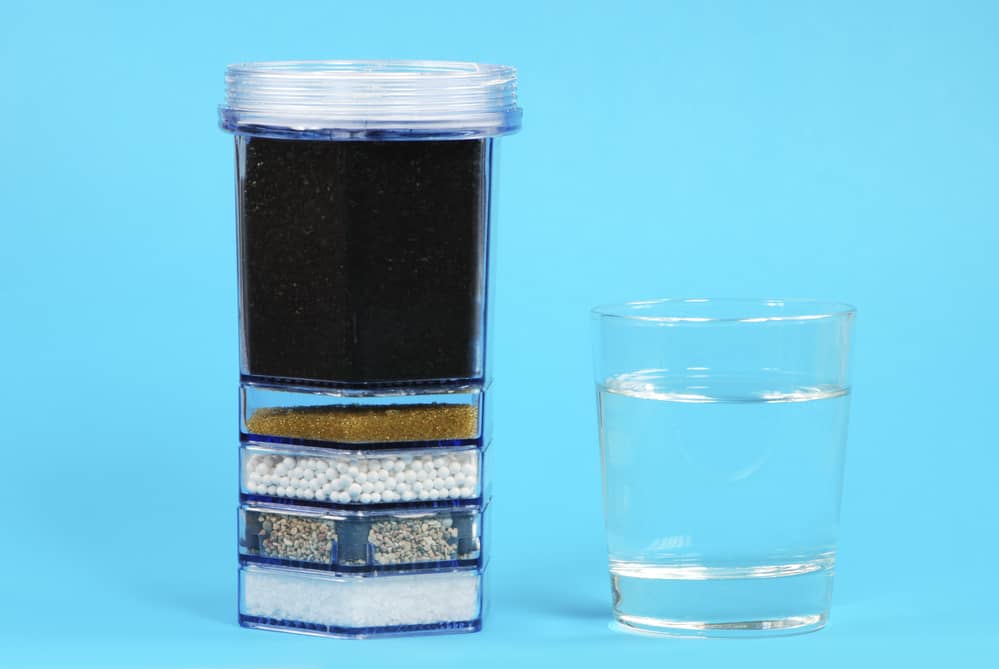We like to share product recommendations with you and hope you like them! Just to make you aware Water Filter Data may collect a small share of sales or other compensation from the links on this page.
We have all experienced that sulfide smell in the tap water in our house. Believe it or not, it is a common occurrence but not everyone knows how to handle it. So, if you want to know more about how to get rid of hydrogen sulfide in the water of your home here is a quick guide to making the process easier for you.
Is it Safe to Drink Water with Hydrogen Sulfide?
The first thing you should know is the hydrogen sulfide gas is poisonous and highly flammable at high concentrations even in water. Fortunately, its presence in your home water is not even remotely enough to be any kind of danger. But, the smell of the tap water may irritate you from time to time, and you may find it unbearable to smell.
Hydrogen sulfide is responsible for corrosion in many metals it touches and its presence in the air can stain silver the moment it touches it. Having a high dosage of hydrogen sulfide in your water supply is rare but not unheard of. If by any chance this is the case and your drinking water does have such amounts of hydrogen sulfide, then you may fall ill, become nauseous, or even die from poisoning.
In most cases, the concentration of hydrogen sulfide in water is less than 10 ppm (milligrams per liter). But, it is not unheard of to go between 50 and 75 mg/l. This compound of chemicals is most often found in well waters, but it is also found in many surface water supplies in the cities.
Detecting the Presence of Hydrogen Sulfide in Water
The first line of defense against hydrogen sulfide is your sense of smell and taste. You can detect its harsh smell from just the running tap water. You don’t need to bring a sample to a laboratory to test, but it would be beneficial for you to do so.
If that’s the case, you may arrange to test your household water in a certified laboratory. Your state’s certification officer can give you the list of certified labs in your locality. If that’s the case, you can call up any certified laboratory and arrange to test the water sample. Your state’s certification office can give you the list of all the certified labs in your area that can provide you with the results of this testing.
The sample that you provide must be chemically stabilized without delay so that the measurement of the concentration of hydrogen sulfide is accurate. So, hurry up because these chemicals can easily be lost because they can escape from the water you are bringing in for testing.
If you don’t know how to collect the sample it is important that you call your laboratory and ask for the right instructions, chemical preservatives, and even for a specific sample bottle. If the contaminated source is wastewater pollution, you might bring two or three samples down to the lab. Just in case they need to test it for bacteria.
Most people are able to identify the presence of hydrogen sulfide in water that was about 0.5 milligrams per liter. If the odor is misty or swampy there is probably 1 milligram per liter. And if the odor is similar to rotten eggs then it’s probably 1 to 2 milligrams per liter. The odor will easily be detected when turning on the cold water. But, the odor also escapes when hot water is running in the tap.
Be careful, because the heat pushes out the hydrogen sulfide gas, which may give off a highly unbearable smell in the room or that area of the house.
Causes of Hydrogen Sulfide Presence in Water
Water itself has many naturally occurring sulfites that are like food for sulfur-reducing bacteria, which produce smelly hydrogen sulfide. This is the main cause for this chemical to appear in your water supply.
Even though it was the main reason there are some causes for hydrogen sulfide in your water, and the most typical are the following.
- There might be some organic matter decomposition in underground deposits, some material from a rotting plant can also be the cause of the problem.
- If your well is drilled in a peat or coal deposit, or sandstone and shale, may act as suppliers of hydrogen sulfide.
- The magnesium rod in the water heaters can prevent most of the corrosion, but sometimes in this process it chemically alters the sulfates and turns them into hydrogen sulfide.
Removing Hydrogen Sulfide from Water

There are many methods that you can use to remove the unwanted substances responsible for that odor. But it really depends on the number of sulfates or hydrogen sulfide in your tap water.
There are two types of treatments
- Point-of-use
- Point-of-entry(whole house treatment)
In severe cases, the point of entry is way more useful and brings better results. But, for quick and immediate solutions, you can go with the point of use and maybe buy bottled water or set up a new well. If the problem is in the sulfur-reducing bacteria, chlorinating your well may be the easiest solution. Just know that this is not a permanent solution and if this problem comes up again continue to read the article.
Keep in mind that the bacteria can come back in the same area many times. So, if you are planning on buying a water treatment device, make sure to test your water for the exact amount of hydrogen sulfide in your water first. You need to check if the rotten egg odor can be detected only in hot water, and if so you need to replace your magnesium rod with an aluminum one. You can also consider the options below.
Granulated Activated Carbon
If your tap water has 0.3 ppm hydrogen sulfide, you can use an activated carbon filter to filter out that nasty taste in your water. However, it may not be able to get that unpleasant odor out.
Iron Removal Filter
This filter is most useful if you are dealing with a concentration of hydrogen sulfide between 1 and 10 milligrams per liter. The filter is filled with manganese greensand. The chemical reaction is the following. The manganese dioxide oxidizes the hydrogen sulfide and forms particles, which are filtered out.
Aeration
This is the last step that you can take and it is best suitable for water with concentrations of 2 milligrams per liter. The chemical interaction between oxygen and hydrogen sulfide will generate that odorless smell of the water.
However, this method produces a strong odor of hydrogen sulfide near the aerator. This can cause an unpleasant experience when the aerator is near living spaces. But keep in mind that this procedure will produce a very strong force near the aerator. This will cause an unpleasant smell in the living space if the aerator is near.
Getting Rid of the Sulfur Smell in the House
You may try the following steps to get rid of that awful sulfur smell from your house. These tips are useful when you have a whole house water filter as well.
White Vinegar
- This is the most used deodorizing chemical. Put some vinegar in the area that smells.
- If your clothes are affected, you can also soak them in vinegar to get rid of the smell
Clean Your Appliances
- If these odors keep coming up, you can start to clean your appliances that use water regularly, even the duct.
Baking Soda
- Baking soda is also a common chemical used to deodorize. You can get baking soda and water and mix them up. You can now pour that water mixture in the areas where the odor is coming from.
- The same mixture can be used on your clothes to get rid of that sulfurous smell.
Frequently Asked Questions
How often should I test my water for hydrogen sulfide?
There’s no need to test your water unless you see a reason to do so. If you’ve recently treated your water for hydrogen sulfide, there’s a chance it might occur again, especially if the method wasn’t used efficiently for the level of hydrogen sulfide.
How does hydrogen sulfide in water taste?
The presence of hydrogen sulfide in water tastes bad. The rotten egg smell can affect the taste of the water too. Some people might experience a bitter taste, while others might not. Luckily, you won’t have to find out what hydrogen sulfide in water tastes like since the bad odor will give you a hint that something is wrong with the water.
How can I prevent the presence of hydrogen sulfide in my water?
There’s little to nothing you can do to prevent the presence of hydrogen sulfide in your water. Since its rotten egg smell is a big indication of the gas, you will know when it’s time to take immediate action. Using the treatment method in the article will remove the smell in the water.
Do I need to test my water for hydrogen sulfide?
Usually, you don’t need to test your water for hydrogen sulfide. You can detect it through smell and taste. Once you’ve identified the eggy smell, you’ll need to call a professional to check the water to determine the level of hydrogen sulfide in it. Note that hydrogen sulfide doesn’t cause any extreme health risks, but when it’s at a high level, it will cause some symptoms.
Does hydrogen sulfide affect only well water?
No, hydrogen sulfide doesn’t only affect well water. However, it is a common occurrence with well water due to underground exposure to matter decomposition. Sulfates are present in the soil, and when it dissolves, it gets into the well water. It can also affect tap water because of water heaters.
How common is it for hydrogen sulfide to affect water?
It’s not very common for hydrogen sulfide to affect water, especially if the well was constructed thoroughly. Also, if your water source is far from a sewer, it’s harder for you to be affected. However, other factors can cause this problem, so it’s best to always be on the lookout.
What health risks does hydrogen sulfide pose?
Hydrogen sulfide can pose health risks such as diarrhea and dehydration. Note that these symptoms occur when there’s a high level of hydrogen sulfide in your water, which is why you should test your water. It’s not just your health it can impact – the taste of your food, clothes, and other materials that come in contact with the water can be damaged.
What treatment works best for water with hydrogen sulfide?
The treatment that works best for water with hydrogen sulfide depends on the level of hydrogen sulfide in your water. If it’s high, you’ll need to be efficient in removing it. A professional would be able to tell what method works best.
Can I use water with hydrogen sulfide to bathe?
If the levels are not too high, you can use it for bathing. However, the off-putting smell can make it impossible for you to do so.
Conclusion
If you made it this far your home is probably odor-free. In only a couple of steps, you now know what causes the problem but, now you also know the solutions to many. Whatever happens, just follow the steps above, and don’t forget to always clean your appliances that use water.

Wayne is a water quality expert – The founder of Water Filter Data. He has a degree in microbiology and his field of expertise is drinking water. His goal is to allow for clean and healthy water for as many people as possible.



